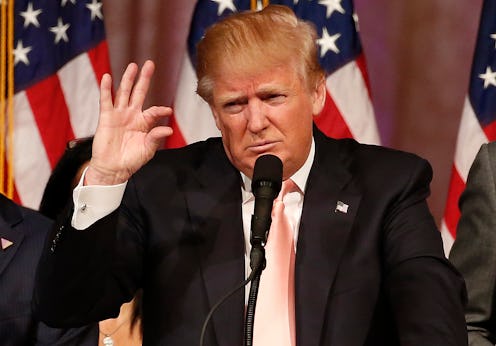News
The Odds Of A Contested Convention
The Republican primary is far from over, and the prospect of Donald Trump winning the party’s presidential nomination is sparking more and more chatter about a brokered convention. If Trump falls short of the 1,237 delegates needed to win the nomination, the result will be a contested convention. But at the end of the day, what are the odds of a brokered convention in the GOP race?
It’s difficult to quantify the chances of Republicans having a brokered convention, because many of the factors that will determine this can’t really be quantified. For example, the Republican National Committee’s Rules Committee (yes, that’s a committee-within-a-committee) could, if it so desired, rewrite the delegate rules at the beginning of the convention in such a way that ensured a brokered convention. But whether that happens will depend solely on what’s going on inside these committee members’ brains when the convention starts.
Furthermore, there’s the lingering but crucial question of what happens to the 100+ delegates won by Marco Rubio, Ben Carson, and other candidates who’ve since dropped out of the race. This is an incredibly thorny question with no single answer, because the delegate rules vary wildly from state to state. Some of these delegates will be unbound at the convention. Others will be reallocated to the other candidates. In some states, their fate will be determined by a vote at yet-to-be-held state conventions, while still other states require that they vote for the candidate they were originally pledged to.
There are just a whole lot of factors here that depend on the whims of obscure people — RNC rules committee members, individual delegates from Kentucky, and so on. It’s impossible to put odds on the decisions these people will make, and that makes gaming out the odds of a contested convention very difficult.
We could just ignore these factors and simply look at the remaining contests: Based on the polls, what are the odds that Trump will win enough delegates to clear 1,237 before the convention?
Unfortunately, there’s no simple answer here, either, because the allocation of delegates depends not just on who wins the statewide vote, but on the vote distribution in individual congressional districts. In winner-take-all states with a trigger, for example, a candidate can walk away with all of the state’s delegates only if they win a majority in each congressional district. As such, it’s hard to predict delegates hauls based on statewide polls.
Having said all of this, it is possible to come very rough conclusions about how likely a brokered convention is. First, we can look at the betting markets. The advantage of doing this is that unlike poll numbers, betting markets reflect where people are actually putting their money. The traders over at PredictIt, one of the most prominent political betting sites, put the odds of a brokered convention at 42 percent, as of this writing.
We can also consult the statisticians at FiveThirtyEight. They, too, haven’t put a specific number on the odds of a contested convention, and some of them have expressed a lot of uncertainty about the issue. But the site isn’t totally silent on the issue. It has charted out what the path to 1,237 delegates looks like on a primary-by-primary basis, and as of this writing, Trump has won 97 percent of the delegates he’d need at this point in the cycle to ultimately lock up the nomination.
This isn’t a probability; it’s simply saying that, if Trump continues to win delegates at roughly the rate he has so far, he’ll have 97 percent of the delegates needed to win the nomination by the time the primaries are over — in other words, he’ll fall short, and there will be a contested convention.
Lastly, there’s the delegate calculator over at Real Clear Politics, which allows you to input various scenarios and calculate how they’d affect the delegate count for each candidate. According to this, Trump will indeed win the 1,237 delegates necessary to clinch the nomination if — and it’s a big if — the final vote tallies in each state correspond exactly with current polling averages.
Ultimately, it’s impossible to arrive at an exact probability that Trump will win the nomination. But it probably is fair to conclude that, whatever eventually comes to pass, it will have come very close to going the other way.
